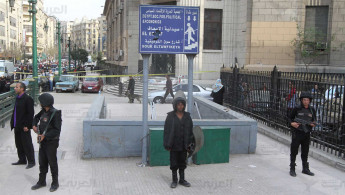Wave of bombings raises fears for Egypt's stability
The recent surge of bombings in Egypt over the past few days can only be understood as a continuation of the crisis the country has been going through since former president Mohammad Morsi was ousted from power on 3 July 2013. The bombings happened in several provinces and targeted security directorates, police stations and offices.
A security expert who spoke on condition of anonymity told al-Araby al-Jadeed, "It is possible this could be the beginning of something that could develop into a wave of violent attacks against the government's policies."
He said he thought it likely the bombings would lead to "major changes in the security leadership". He added "Despite the police's discipline, the current chaos makes anything possible."
The source refused to elaborate on what this could mean.
Bombing civilian areas
| This could be the beginning of a wave of violent attacks against the government's policies. - Security expert |
One of the attacks in the recent surge of bombings was the explosion of a makeshift bomb next to Bab Sharq police station in downtown Alexandria, where there is the office of the assistant minister of defence for the west Delta. No one was injured in the explosion. The bomb was made out of a modified sound grenade and was placed next to the police station's wall by unknown assailants. Observers have said these attacks could mean that senior security officials would be the targets of future attacks.
There were other bombings in Alexandria, but no group has claimed responsibility for the attacks,. One was killed and nine were injured after two bombs went off next to a well-known shopping centre in the Seyouf district of eastern Alexandria. Police also reported another bomb close to the Moharram Bek police station that injured four people and damaged nearby cars and the fronts of buildings and shops.
The government and opposition have blamed each other for the bombings. The government blames pro-Morsi groups, while Morsi supporters think the security services have carried out the bombings to pin the blame on them.
Previous bombings have generally been far from civilian areas, but these attacks have targeted police in broad daylight in the presence of civilians with no regard for the lives of bystanders. This is a significant change in tactics.
Although no group has claimed responsibility for the recent bombings, a group calling itself Revolutionary Punishment bombed the High Court in downtown Cairo on 2 March, killing two people and injuring nine people most of whom were policemen. The group declared itself on the fourth anniversary of the January 25 revolution, after it attacked police directorates and gunned down policemen in an ambush on the Ring Road in Cairo. According to the group's sporadic statements the attacks were "revenge for the systematic killing, arrests and torture against the opponents of the current regime."
Revolutionary Punishment's previous attacks have seemed poorly planned, limited in scope and have not targeted civilians, but the attack at the High Court was professional and well-planned.
Islamic militant groups such as Ansar Bait al-Maqdis - now known as Wilaya Sinai after it pledged allegiance to the Islamic state group (IS) - and Ajnad Misr have stressed they do not attack the military and police in places where there are civilians present. A media official in Ajnad Misr who spoke on condition of anonymity told al-Araby al-Jadeed: "The group does not carry out attacks that harm civilians."
He also said the group had no part in the attack on the High Court.
More attacks on the way?
| The government and opposition have blamed each other for the bombings. |
An expert in Islamic groups, Alaa al-Nadi, said current government's policies against opponents "will increase the number of attacks against soldiers and policemen and could lead to attacks against civilians."
He added, "There are groups within the Anti-Coup Alliance that are not part of any specific organisation that have emerged from it and turned to violence with no legitimate vision or justification."
He added "No one seems to be able to control these groups considering the security strikes, attacks against the opposition and the violence to young people. The Islamic movements are also facing challenges as young members have begun to reject the idea of receiving blows from the security services without responding strongly."
Nadi warned it was possible that the situation could "escalate out of control if leaders cannot hold back young members as the security crackdown, violence, torture and killing continue against the groups."
He added, "If the leaders do not quickly address the issue they may soon lose control of the situation, which would pose a great threat for them and the Egyptian state."
Regarding the change in strategy to targeting civilians, Nadi said, "As of now the source of the bombings is unknown, unlike the groups we know about that declare responsibility [for their attacks]."
A political expert who spoke under the condition of anonymity told al-Araby "It is possible there are parties interested in creating a state of conflict in Egypt." He added "It is also possible these parties do not want Egypt to be stable and it is in their interests to keep the country in its current state."
This is an edited translation from our Arabic edition.



